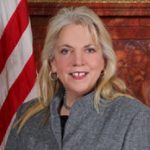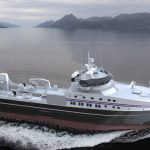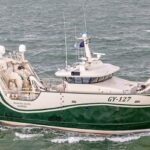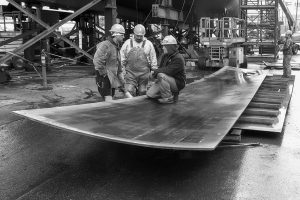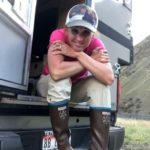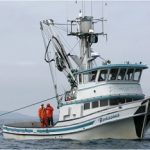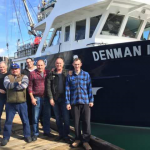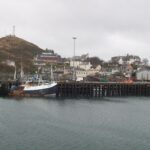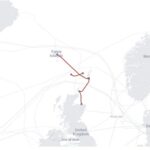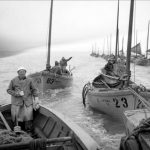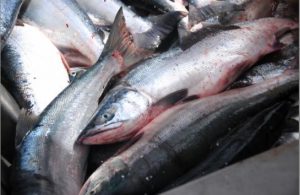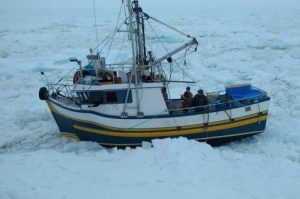Daily Archives: May 31, 2017
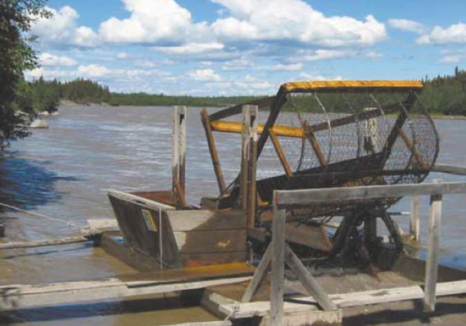
Good bad news?
The Copper River commercial salmon fishery ended Tuesday almost 2,000 Chinook over the 5,000-salmon threshold the Alaska Department of Fish and Game set as the acceptable harvest for 2017, and the fishing season has only begun. Steve Moffitt was at the time reported to be hiking somewhere along the Appalachian Trail on the East Coast of North America some 4,500 miles southeast of the tiny port, community of Cordova on the West Coast not far from the mouth of the Copper. Who the hell is Steve Moffitt? He’s the commercial fisheries biologist who penned a bombshell forecast calling for the return of but 29,000 king salmon, as Alaskans most often call Chinook, to the Copper River this year. He then promptly retired, leaving behind what has now become Alaska’s most watched fishery for a number of reasons: click here to read the story 19:50
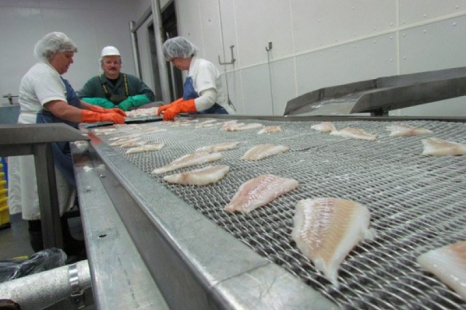
Arnold’s Cove plant owner anxiously awaiting decision on offshore 3Ps
Alberto Warehem is both frustrated and worried. The owner of Icewater Seafoods Inc. in Arnold’s Cove has yet to receive his allocation of offshore 3Ps Cod, even though the Department of Fisheries and Oceans (DFO) announced cod quotas for that fishing zone on Friday, May 19. For the 2017-18 season, the Total Allowable Catch (TAC) for 3Ps cod is 6,500 tonnes. This is a nearly 50 percent reduction from the 2015-2016 TAC of 13,490 tonnes. Wareham needs more detail, however, on how the quota reductions will impact his business. He has 200 workers who depend on the offshore cod quota. For the past several years, the offshore quota of cod gave them 10-12 weeks of work each season; or about 30-40 percent of their annual employment. click here to read the story 19:14
Massachusetts: $185K for fishing research in proposed fiscal year 2018 budget
 The state Senate has added $185,000 for commerical fishing research to its proposed Fiscal Year 2018 budget. State Senate Minority Leader Brice Tarr, R–Gloucester, and state Sen. Mark Montigny, D–New Bedford, worked together to amend the budget. The money will help fund the Industry Based Survey, which partners commercial fishermen with scientists to gather data and develop a science-based understanding of the region’s cod stocks. Those stocks are often viewed as a barometer of the health of many other ground fish stocks, such as haddock and flounder. click here to read the story 18:14
The state Senate has added $185,000 for commerical fishing research to its proposed Fiscal Year 2018 budget. State Senate Minority Leader Brice Tarr, R–Gloucester, and state Sen. Mark Montigny, D–New Bedford, worked together to amend the budget. The money will help fund the Industry Based Survey, which partners commercial fishermen with scientists to gather data and develop a science-based understanding of the region’s cod stocks. Those stocks are often viewed as a barometer of the health of many other ground fish stocks, such as haddock and flounder. click here to read the story 18:14
NT fisherman left with gaping arm wound after developing flesh-eating virus
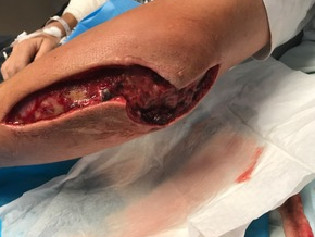 A fisho has been left with a “gaping hole” in his left arm after being spiked by a sawshark and developing a rare flesh-eating virus on a boat off the Darwin coast. The wound on Peter Lucas’ arm is now about 15cm long, and deep enough to reach bone.,, “Sawsharks are an endangered species, so we have to cut them out of the net alive and try and get them overboard in the best condition we possibly can,” he said. “In doing that, the sawshark gave a little bit of a flick … his top tooth just very lightly pierced my elbow. “The operation side of it — the theatre and the doctors — was perfect — they did a great job on my arm. click here to read the story 15:23
A fisho has been left with a “gaping hole” in his left arm after being spiked by a sawshark and developing a rare flesh-eating virus on a boat off the Darwin coast. The wound on Peter Lucas’ arm is now about 15cm long, and deep enough to reach bone.,, “Sawsharks are an endangered species, so we have to cut them out of the net alive and try and get them overboard in the best condition we possibly can,” he said. “In doing that, the sawshark gave a little bit of a flick … his top tooth just very lightly pierced my elbow. “The operation side of it — the theatre and the doctors — was perfect — they did a great job on my arm. click here to read the story 15:23
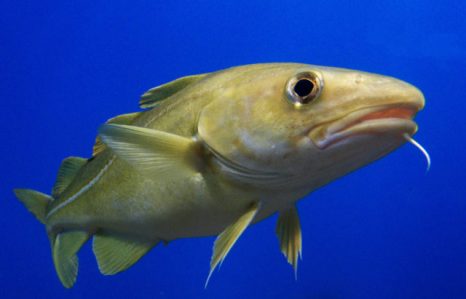
Choppy waters lay ahead for U.S. fisheries – Rebuilding Timeline – Science, or Fiction
Proposed changes to the Magnuson-Stevens Act, our nation’s fishery management law, would compound problems for the nation’s fish, says birder Harrison Tasoff. Fishery management got a significant boost when the act was reauthorized in 2007. The new legislation required the councils to base their strategies and quotas on scientific population surveys. It is crucial that these fish surveys are done by marine biologists. Professional fishermen’s knowledge of fish runs as deep as some of the waters they trawl. But their background prepares them for different kinds of tasks than a marine biologist, whose years of training equip them with the skills to conduct surveys and model ecological phenomena. The 2007 reauthorization also strengthened the timeframe that the agencies have to rebuild depleted fish stocks. Click here to read the article The Magnuson Stevens Act and its Ten Year Rebuilding Timeline: Science or Fiction? by Meghan Lapp One of the initial problems with a mandatory ten year rebuilding timeline is that it creates conflict within the law itself. Taking into account that a defined rebuilding schedule cannot be justified by science, a ten year requirement, or any time specific deadline at all,,, Click here to read the article 13:19
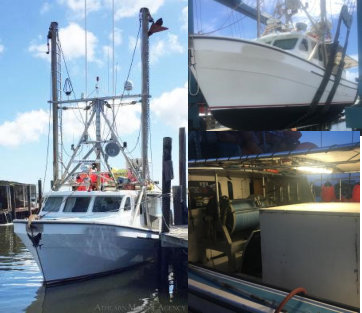
Athearn Marine Agency Boat of the Week: 45′ Provincial Longliner, 530HP, Cummins 6CTA Diesel, Phasor – 6 KW Genset
Specifications, information and 11 photo’s click here To see all the boats in this series, Click here Vessel is in good condition. Tri-pack with Directed Swordfish, Shark, Atlantic Tunas Longline with 2% total Bluefin Quota and Spanish Mackerel for an additional $50,000.
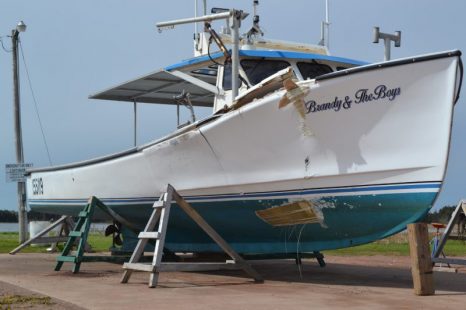
Fishing boats collide near Tignish
A Tignish lobster fishing boat sustained extensive damage to its starboard side when it collided with another lobster boat Monday morning. Both vessels made it back to port under their own power. The Brandy & The Boys was subsequently hauled from the water. Click here to read the story 11:28
Georgia shrimp season opens June 1
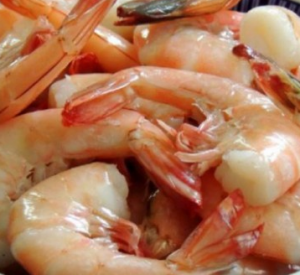 Georgia waters will open for commercial and recreational harvest of food shrimp at 8 a.m. Thursday. “The white shrimp abundance in our May coastwide trawl survey is higher compared to historic averages for the month of May,” said Lindsey Aubart, the Coastal Resources Division biologist supervising monthly shrimp sampling. “The shrimp sizes are highly desirable to recreational harvesters and valuable to commercial fishermen. The recommendation to open on June 1 was made after taking into consideration our May survey results and input received from our Shrimp Advisory Panel.” Last year there were 261 licensed shrimp trawlers and 25 cast-net shrimp harvesters. They brought in an estimated $8.3 million worth of shrimp. click here to read the story 09:56
Georgia waters will open for commercial and recreational harvest of food shrimp at 8 a.m. Thursday. “The white shrimp abundance in our May coastwide trawl survey is higher compared to historic averages for the month of May,” said Lindsey Aubart, the Coastal Resources Division biologist supervising monthly shrimp sampling. “The shrimp sizes are highly desirable to recreational harvesters and valuable to commercial fishermen. The recommendation to open on June 1 was made after taking into consideration our May survey results and input received from our Shrimp Advisory Panel.” Last year there were 261 licensed shrimp trawlers and 25 cast-net shrimp harvesters. They brought in an estimated $8.3 million worth of shrimp. click here to read the story 09:56
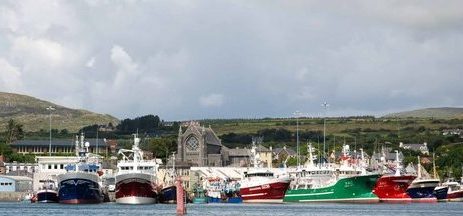
Ireland in danger of losing 30 more fishing vessels with the loss of an estimated 360 jobs say South West fishermen
There have been a lot of the same repeated statements about the rights of 23 RSW Pelagic vessels who have 40% of the €275,317,000 total earnings of Irelands fishing fleet, an estimated 100 million Euro in 2016 increasing to 110 million in 2017. Reports across various media have communicated a message that a Mackerel war has started between North and South. Nothing could be further from the truth. It is amazing to me personally how people’s perception can override the facts but the human brain is an extraordinary muscle. To give a little background on recent events, the Irish South & West Fish Producers Organisation and our colleagues in the fishing Industry were informed by Senior officials in the Department of Marine in early 2016 that our tiny fishing fleet is still too big for our nations meagre fish allocations from the European Union in predominantly our waters that produce some 30% of all fish landed in Europe. We were told that cuts were required to be made to the Whitefish fleet of 30 boats measuring between 12 – 23 Meters. Click here to read the story 09:28
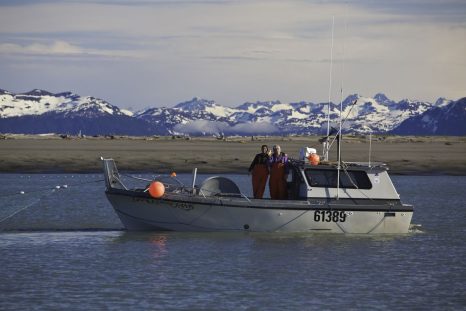
Longtime Cordova fisherman found dead after going overboard on Copper River
A Cordova man was found dead Thursday after going overboard in the Copper River flats during a stormy commercial fishing opener. Clifford “Mick” Johns, 69, had been fishing alone that day on his 29-foot gillnetter, named Dances With Clams. At about 9 p.m., the U.S. Coast Guard received a report that the boat was “driving around in circles with no one onboard” near Pete Dahl Slough, an area of the Copper River flats fishing grounds southeast of Cordova, according to the Alaska State Troopers. “It didn’t look like anybody was manning it,” said Petty Officer 1st Class Jon-Paul Rios of the Coast Guard’s District 17 Public Affairs Office in Juneau. A Coast Guard helicopter stationed in Cordova was called in to search from the air. The helicopter crew found Johns’ body in the water, according to Rios. Click here to read the story 08:41






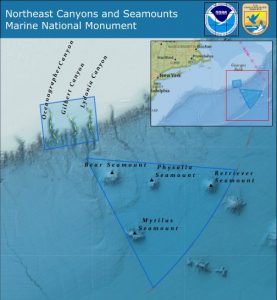 New England fishery regulators might seek to reclaim some of the authority they lost when President Barack Obama virtually walled off thousands of square miles of ocean south of Cape Cod to commercial fisheries. On Tuesday, the New England Fisheries Management Council’s Habitat Committee recommended that the regulatory council provide feedback to the Trump administration about the designation of the 4,913 square-mile area by the continental shelf. “I would strongly suggest we take the opportunity to comment,” said Eric Reid, a council member and the general manager of Seafreeze Shoreside, a seafood processing facility in Galilee, Rhode Island. While the committee members did not delve into what the letter should say during Tuesday’s meeting, the council chairman, former Rep. John Quinn, the director of public interest at the UMass School of Law in Dartmouth, made clear he believes the council should have jurisdiction.
New England fishery regulators might seek to reclaim some of the authority they lost when President Barack Obama virtually walled off thousands of square miles of ocean south of Cape Cod to commercial fisheries. On Tuesday, the New England Fisheries Management Council’s Habitat Committee recommended that the regulatory council provide feedback to the Trump administration about the designation of the 4,913 square-mile area by the continental shelf. “I would strongly suggest we take the opportunity to comment,” said Eric Reid, a council member and the general manager of Seafreeze Shoreside, a seafood processing facility in Galilee, Rhode Island. While the committee members did not delve into what the letter should say during Tuesday’s meeting, the council chairman, former Rep. John Quinn, the director of public interest at the UMass School of Law in Dartmouth, made clear he believes the council should have jurisdiction. 


























